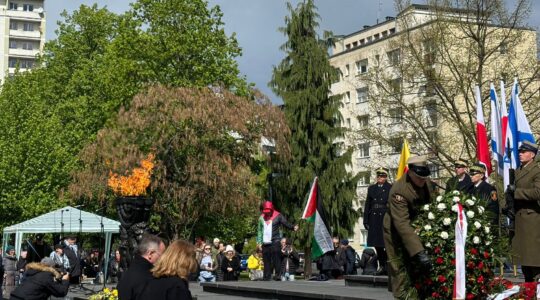
This newborn male donkey was the subject of a rare pidyon peter chamor ceremony in Australia, May 3, 2009. (Leon Shapiro)

Orthodox Jews in Australia exchange a sheep for a donkey in a pidyon peter chamor ceremony in Australia, May 3, 2009. (Leon Shapiro)

Children look at the donkey before his redemption in a rare pidyon peter chamor ceremony in Australia, May 3, 2009. (Leon Shapiro)
SYDNEY, Australia (JTA) — It took nearly two years, cost more than $7,500, and involved two donkeys, one sheep, a case of mistaken sexual identity, several DNA tests and the unwavering faith of two fervently Orthodox Jews in Australia.
On Sunday, more than 1,500 mostly Orthodox Jews in Melbourne witnessed what is believed to be the first “pidyon petter chamor” — redemption of a first-born male donkey — celebrated in Australia.
The story of how this rare Jewish ritual transpired reads like a Hollywood film script.
Berel Goldberger, a Vishnitzer Chasid, and Binyomin Friedman, a Belzer Chasid, stumbled across the ancient practice during their daily study session at the Adass Israel Congregation more than two years ago.
Like the redemption of a first-born male child, “pidyon haben,” this ritual involves buying the first-born male donkey back from a Kohen, albeit in exchange for a sheep instead of money. The redemption means the donkey can be used rather than be slaughtered.
“Even though it’s not a kosher animal, the donkey has special significance,” Goldberger told JTA. “When the Jews went out of Egypt, the donkeys carried lots of loads.”
Intrigued, the pair investigated the possibility of conducting the ancient mitzvah in Australia.
“We found out it can be done halachically and practically,” Goldberger said.
The only donkey breeder they could find, however, was in Canberra, about 400 miles away. There, a maiden female ass who had never been pregnant or miscarried was selected and mated with a male. She soon became pregnant.
On March 12, the two Adass men received a bittersweet phone call from the breeder: The donkey gave birth to a female.
The men remained resolute.
“We decided we wanted to keep going and started looking for a new maiden to start the whole process over again,” Goldberger said.
But in a twist, the breeder called back a few days later to say she had been mistaken and the foal actually was a male.
Under the instructions of Adass Chief Rabbi Avrohom Zvi Beck, the two men ordered a DNA test to be sure. Since the baby donkey’s hair was too thin, the first two tests were inconclusive. The result of the third DNA test was positive.
“We were thrilled,” Goldberger said. “We really wanted to do this mitzvah.”
Since it was such a rare event, the Adass community — a non-Zionist, tightly knit cluster of about 200 families in Melbourne — threw a simcha. Parliament member Michael Danby, whose electorate includes the Adass shul, was among those in attendance.
“It was a very happy occasion,” Danby said. “All the kids were excited because there was a donkey there. To me it says something about the vitality of the Australian Jewish community, including its Orthodox element, that it has the self-confidence, persistence and discipline to make it happen.”
Shlomo Abelesz, a longtime Adass member, said he was confident it was a first for Australia.
“It happens in Israel every now and then, it happened in Argentina a year or two ago. I got an e-mail from Montreal saying it happened there,” he said. “It’s a rare and unusual mitzvah. Who has donkeys these days?”
Video footage of the obscure ceremony shows the sheep on one side of the stage and the baby donkey, decorated with a flower necklace and a coat inscribed with Hebrew passages from the Torah, on the other.
After the recital of blessings, the sheep was handed over to the Kohen, symbolizing the redemption of the baby donkey.
“It probably looks strange, a bit primitive,” Yumi Rosenbaum acknowledged. “But there’s a general theme throughout Judaism about the first of anything — the first fruit, first born and so on. It was fairly unique.”
And the donkeys? Mom has been named Tip Top and baby is going to be called Peter, Goldberger said. They’re living happily on a farm outside Melbourne.
As for the sheep, it was slaughtered on Tuesday, and its meat was given to needy families.
But the sheep will have a legacy nonetheless: A cushion is being made from its skin to be used at circumcision ceremonies in the Adass community.





